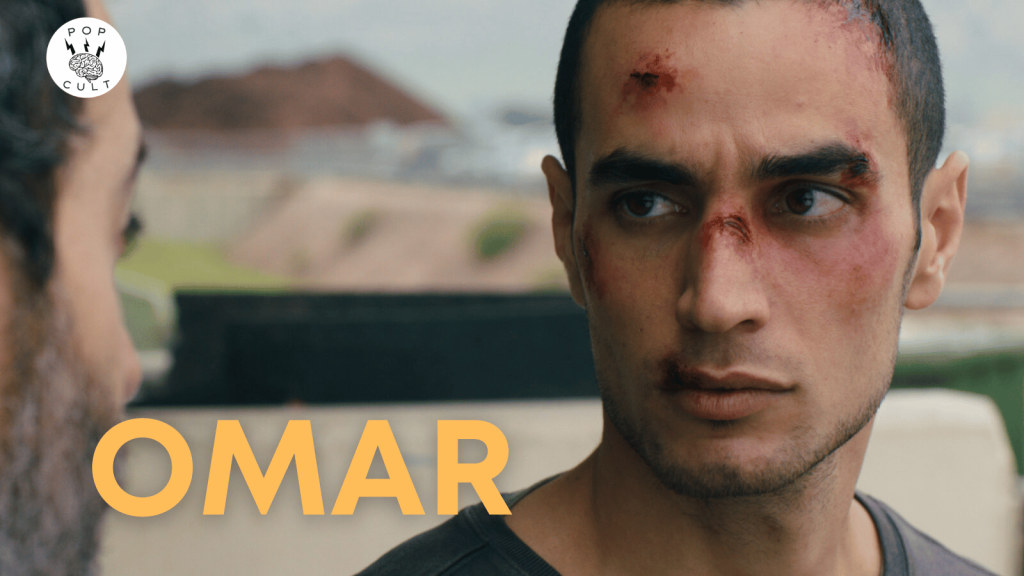Omar (2013)
Written and directed by Hany Abu-Assad
I won’t say any more on this, but the ending of Omar is one of the most satisfying conclusions I have ever seen in a film, yet it still leaves a bittersweet taste in your mouth. This is filmmaker Hany Abu-Assad’s first writer/director gig. He’d previously directed but co-written with one or more people. While not having seen that much of his work, the breakout film Paradise Now has always resonated with me. I was curious to see what story he had to tell after such an intense character-focused narrative. Once again, we get another narrative about a young Palestinian man caught in difficult circumstances, his friendships being challenged, and a moment hurtling toward him where he must make a decision that will shape the rest of his life going forward.
Omar ( Adam Bakri) is a baker forced to climb the West Bank barrier to visit his girlfriend, Nadia. Nadia’s brother is also one of Omar’s friends, and the relationship has been kept a secret as they are relatively sure he would disapprove. Meanwhile, the boys have been practicing attacks on Israeli soldiers as part of the resistance movement they have joined. They eventually grow confident to execute their plan and end up killing an occupying soldier during a nighttime attack. Apparently, someone inside the group is feeding information to the Israelis. Omar is caught and brought before Rami, an interrogator. Rami pushes Omar to turn on his comrades and even knows about Nadia. Eventually, they drop the young Palestinian back into the West Bank, and he’s suspected of collaborating. Things fall apart as Omar tries to convince his friends he’s on their side while Rami ratchets the pressure to betray them.
I appreciated that Omar showed an all too common side of colonization. The colonizer understands the importance of sowing mistrust among the colonized. You don’t have to get someone to become an informant to create discontent; just make their comrades think they are telling secrets. Once that spreads through a community, some voluntarily go to the colonizers and offer to inform. They have been convinced so many around them are already doing that, whether true or not. The seeds of hyper-individualization are planted and growing nicely in the eyes of the occupier.
The clever colonized person will become a false informant, feeding the enemy information tinged with just enough truth to be believable. This is the predicament Omar finds himself in, needing to prove to his comrades he’s still on their side while keeping the occupiers at bay. The result is a film that is less about ideologies and more about the human condition. Omar is a person who wants to live a quiet, simple life with the woman he loves, but the circumstances of his birth prevent this from being a possibility. Similarly to how Abu-Assad was able to humanize a suicide bomber, he does the same here. These are people forced into a corner and doing what they deem necessary to survive.
The director has constructed a tight thriller/romance that goes toe to toe with Hollywood’s recent fare. The actors here are mostly first-timers, at least in a production of this scale, and everyone holds their own. They encapsulate these characters so believably, likely because they are not too far from their own life experiences. Like all good human drama, the stakes of the film are the tension between one’s own personal desires and the needs of those they love. Omar just wants to marry Nadia and work as a baker. His friends are relying on him to be a part of the movement. Rami sees Omar as a means to an end, a way to disrupt any effective resistance from his group.
Thematically, the picture touches on the difficulty of loving someone in such dire circumstances. If we think about Gaza at the moment and the way priorities shift, they are people who were in love, and those relationships have been broken apart either by death at the hands of the occupiers or geographical separation. There are so many love stories that have been shattered by Israeli bombs and bullets over the decades. If an occupying force takes away a person’s ability to have romantic love, they are the architects of their eventual demise. People will not let their humanity be torn away without a brutal fight.
There’s a brief flight of fantasy between Omar and Nadia about their life when they get married. They talk about living in Paris, but the performances and dialogue tell us they can’t become lost in that fantasy. Life for them will be what it is now, living behind walls that threaten to blot out the son, under the watchful eye of an entity that wishes them dead. It would be silly to expect this to be a film that provides a stock Hollywood happy ending. If you are familiar with Paradise Now, you know the filmmaker doesn’t shy away from conclusions that will tear your heart out.
Omar isn’t flawless. The second act has some moments where the script meanders. We get some conversations between Omar and Nadia that feel a tad redundant, and the film holds off on revealing its twist a little too long. I appreciate the chase sequences; they are very well choreographed and shot. There’s a great moment where a group of Palestinian kids emerge to chuck rocks at pursuing Israelis while Omar is helped by strangers whose homes he ducks into to outrun his pursuers. If you are in the mood for a tense action thriller but don’t want jingoistic Hollywood claptrap, Omar is an excellent option, and I would love to know what you think of that final sequence.


One thought on “Movie Review – Omar”